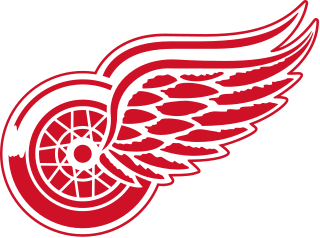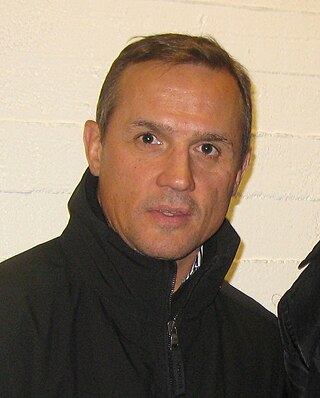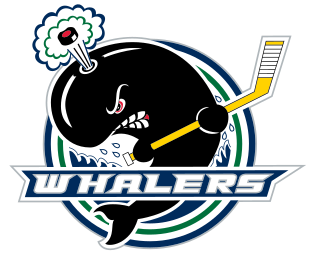
The Detroit Red Wings are a professional ice hockey team based in Detroit. The Red Wings compete in the National Hockey League (NHL) as a member of the Atlantic Division in the Eastern Conference, and are one of the Original Six teams of the league. Founded in 1926, the team was known as the Detroit Cougars until 1930. For the next two seasons, the team was named the Detroit Falcons, before changing their name to the Red Wings in 1932.

The Nashville Predators are a professional ice hockey team based in Nashville, Tennessee. The Predators compete in the National Hockey League (NHL) as a member of the Central Division in the Western Conference, and have played their home games at Bridgestone Arena since 1998. Their television broadcasting rights are held by Bally Sports South, and the Nashville Predators Radio Network flagship station is WPRT-FM. The Predators are currently affiliated with two minor league teams: the Milwaukee Admirals of the American Hockey League (AHL), and the Atlanta Gladiators of the ECHL.

Stephen Gregory Yzerman is a Canadian former professional ice hockey player currently serving as executive vice president and general manager of the Detroit Red Wings, with whom he spent all 22 seasons of his NHL playing career. Widely regarded as one of the greatest players of all time, he is a Detroit sports icon and a member of the Hockey Hall of Fame. After his retirement as a player, he served in the front office of the Red Wings, and then as general manager of the Tampa Bay Lightning, while also being executive director for Team Canada in two Olympics.

Pavel Valeryevich Datsyuk is a Russian former professional ice hockey player. Datsyuk was nicknamed the "Magic Man" honoring his incredible stickhandling and creativity with the puck. From 2001 to 2016, he played for the Detroit Red Wings of the National Hockey League (NHL). In 2017, Datsyuk was named one of the "100 Greatest NHL Players" in history, and was the only active player outside of the NHL at the time of announcement.

The Chicago Stadium was an indoor arena in Chicago that opened in 1929, closed in 1994 and was demolished in 1995. It was the home of the National Hockey League's Chicago Blackhawks and the National Basketball Association's Chicago Bulls. It was used for numerous other sporting events, opening with a championship boxing match in March 1929. The Stadium was built by Paddy Harmon, a promoter, who sank his entire fortune into the project, only to lose control to the Stadium shareholders, and leave his family nearly penniless a year later when he died. After exiting receivership in 1935, the Stadium was owned by the Norris and Wirtz families until its closure in 1994.
Vladimir Nikolaevich Konstantinov is a Russian-American former professional ice hockey player who played his entire National Hockey League (NHL) career, from 1991 to 1997 with the Detroit Red Wings. Previously, he had played for Soviet club CSKA Moscow. His career was ended in a limousine crash six days after the Red Wings' 1997 Stanley Cup victory.

The 1998 Stanley Cup Finals was the championship series of the National Hockey League's (NHL) 1997–98 season, and the culmination of the 1998 Stanley Cup playoffs. It was contested by the Western Conference champion and defending Stanley Cup champion Detroit Red Wings and the Eastern Conference champion Washington Capitals. It was the 105th year of the Stanley Cup being contested. The series was the Capitals' first appearance in a Stanley Cup Finals since the franchise's inception in 1974. The Red Wings won the series for the second year in a row, four games to none, to capture their ninth Stanley Cup in team history. This was the fourth consecutive Stanley Cup Finals that concluded with a sweep, as well as the most recent time it has happened. Detroit coach Scotty Bowman won his eighth Stanley Cup in that capacity, tying him with former Canadiens coach Toe Blake for the record of most Cups won by a coach.
The Curse of 1940, also called Dutton's Curse, was a superstitious explanation for why the National Hockey League (NHL)'s New York Rangers did not win the league's championship trophy, the Stanley Cup, from 1940 through 1994.
The Avalanche–Red Wings brawl was a large-scale on-ice melee that occurred March 26, 1997, at Joe Louis Arena in Detroit, between two National Hockey League (NHL) rivals: the Colorado Avalanche and Detroit Red Wings. The brawl, which has been nicknamed Bloody Wednesday, Fight Night at the Joe and Brawl in Hockeytown, stemmed from a previous on-ice incident between the two teams during the 1996 Western Conference Finals. The game featured 18 fighting major penalties and 144 minutes in penalties.

The Detroit Whalers were a junior ice hockey team in the Ontario Hockey League for two seasons from 1995 to 1997. The Whalers were based in Auburn Hills, Michigan.

The Legend of the Octopus is a sports tradition during Detroit Red Wings home playoff games involving dead octopuses thrown onto the ice rink. The origins of the activity go back to the 1952 playoffs, when a National Hockey League team played two best-of-seven series to capture the Stanley Cup. Having eight arms, the octopus symbolized the number of playoff wins necessary for the Red Wings to win the Stanley Cup.
Al Sobotka is an American building operations manager who formerly worked for Olympia Entertainment. His responsibilities included day-to-day operations at Little Caesars Arena. Sobotka was fired on March 30, 2022. He was also involved in the operations of Cobo Arena until Olympia Entertainment relinquished management in 2011 and Joe Louis Arena until it closed for good in 2017. Sobotka is known mostly for driving the Zamboni during Detroit Red Wings games for the past 30 years and for collecting the octopuses thrown on the ice during Red Wings playoff games. The official mascot of the Red Wings is named after Sobotka. Sobotka came in second with 97,261 votes in Zamboni News' 1999 Zamboni "Driver of the Year" Award.
The 2007–08 Pittsburgh Penguins season was the franchise's 41st season in the National Hockey League (NHL). Their regular season began on October 5, 2007, against the Carolina Hurricanes and concluded on April 6, 2008, against the rival Philadelphia Flyers. The Penguins looked to improve upon their progress in the 2006–07 season after being eliminated in the first round of the Eastern Conference playoffs by the Ottawa Senators. During the season, the Penguins wore gold patches with "250" on them, honoring the city of Pittsburgh's 250th anniversary in 2008.
The 1966 Stanley Cup Finals was the championship series of the National Hockey League's (NHL) 1965–66 season, and the culmination of the 1966 Stanley Cup playoffs. It was contested by the Detroit Red Wings and the defending champion Montreal Canadiens. The Canadiens won the best-of-seven series, four games to two, to win the Stanley Cup for the seventh time in eleven years.

The 2009 Stanley Cup Finals was the championship series of the National Hockey League's (NHL) 2008–09 season, and the culmination of the 2009 Stanley Cup playoffs. It was contested between the Eastern Conference champion Pittsburgh Penguins and the Western Conference champion Detroit Red Wings. It was Detroit's 24th appearance in the Finals and Pittsburgh's fourth appearance in the Finals. This was a rematch of the previous year's Stanley Cup Finals where Detroit had defeated Pittsburgh in six games. This time, Pittsburgh defeated Detroit in seven games to win their third Stanley Cup in franchise history. Pittsburgh's Evgeni Malkin would win the Conn Smythe Trophy as the Most Valuable Player of the 2009 playoffs, becoming the first Russian-born player to win the trophy. Until 2021, this was the last time the finals were played entirely in the Eastern Time Zone.
The history of the Detroit Red Wings begins in 1926, when the franchise began play in the National Hockey League (NHL). The professional ice hockey club was founded as the Detroit Cougars on September 25, 1926, one of three teams to join the NHL in 1926. With the demise of the Western Canada Hockey League (WCHL), the rights to the players of the Victoria Cougars were purchased by a Detroit group led by Charles A. Hughes who kept the name "Cougars" for their NHL club. The new team struggled financially; in 1930, the Cougars changed their name to the Detroit Falcons, and after being bought out of receivership by James E. Norris were renamed as the Detroit Red Wings in 1932. The team played their first game on November 18, 1926, and won their first two Stanley Cup titles in 1936 and 1937. The Red Wings have won the Cup eleven times, more than any other American team in NHL history.
The rat trick was a celebration performed by fans of the Florida Panthers of the National Hockey League (NHL) during their 1995–96 season, in which plastic rats were thrown onto the ice to celebrate goals. The term, a play on hat trick, was coined by Panthers goaltender John Vanbiesbrouck after teammate Scott Mellanby killed a rat in the locker room prior to the team's home opener with his stick, then scored two goals with the same stick. By the time the Panthers reached the 1996 playoffs, thousands of rats hit the ice after every Panthers goal, resulting in an off-season rule change by the NHL that allowed for referees to penalize the home team if fans disrupted the game by throwing objects onto the ice.

The Maple Leafs–Red Wings rivalry is a National Hockey League (NHL) rivalry between the Toronto Maple Leafs and the Detroit Red Wings. The rivalry is largely bolstered because of the proximity between the two teams, with Toronto and Detroit approximately 370 kilometres (230 mi) apart, connected by Ontario Highway 401, and a number of shared fans in between the two cities. The teams both compete in the Atlantic Division and with current NHL scheduling, they meet three or four times per season.

The Avalanche–Red Wings rivalry is a historic rivalry in the National Hockey League (NHL) between the Colorado Avalanche and Detroit Red Wings. The rivalry gained notoriety during the mid-1990s and early 2000s, with the peak of the rivalry occurring from 1996 to 2002 during which stretch the two teams met in the postseason five times and combined to win five Stanley Cups, with the Red Wings winning three Stanley Cups and the Avalanche winning two during that stretch. The epicenter of the rivalry was during a March 26, 1997 game at Joe Louis Arena that featured 18 fighting majors, and 148 penalty minutes.











